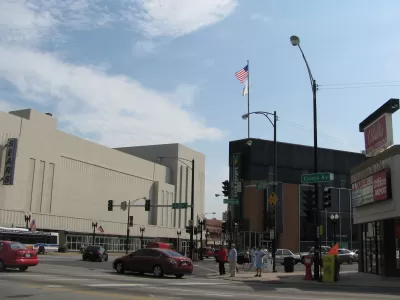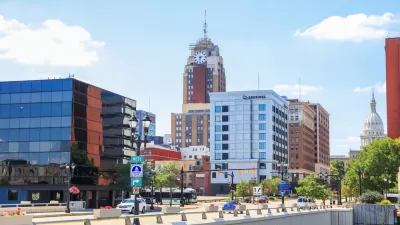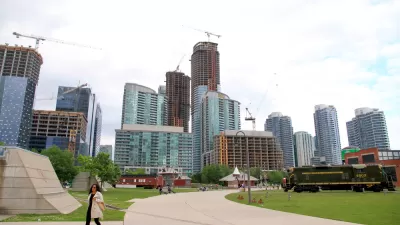In a decision that is still impossible in most of the country, Chicago's Department of Planning and Development is requiring housing and reduced surface parking to approve a retail project.

Chicago's Department of Planning and Development (DPD) has rejected a proposed development due to its "auto-centric plan" and "too much car parking," as well as its failure to include housing, writes John Greenfield. According to a Streetsblog Chicago article by John Greenfield, The Shops at Six Corners proposal called for more than 800 parking spaces and used the majority of the property for surface parking.
In a letter from the DPD, the department stated that "community stakeholders wanted to see the site developed to medium-scale density with a mix of commercial and residential land uses," and that the developer, GW Properties, "should engage in a community-led visioning process before resubmitting its application." Community members praised the DPD's rejection of the "overparked" proposal. In addition to calling for a housing component, the DPD indicated several additional requirements including a parking demand analysis, multilevel garage parking to minimize surface lots, separated pedestrian pathways, and design guidelines such as "avoiding large expanses of blank walls in areas with heavy foot traffic." According to the DPD, "the current proposal does not meet the standards of design excellence. Building design should consider and respect the character of the existing building stock in the Six Corners neighborhood."
FULL STORY: DPD denies approval for car-centric 6 Corners Project that is “significantly overparked”

Study: Maui’s Plan to Convert Vacation Rentals to Long-Term Housing Could Cause Nearly $1 Billion Economic Loss
The plan would reduce visitor accommodation by 25,% resulting in 1,900 jobs lost.

North Texas Transit Leaders Tout Benefits of TOD for Growing Region
At a summit focused on transit-oriented development, policymakers discussed how North Texas’ expanded light rail system can serve as a tool for economic growth.

Using Old Oil and Gas Wells for Green Energy Storage
Penn State researchers have found that repurposing abandoned oil and gas wells for geothermal-assisted compressed-air energy storage can boost efficiency, reduce environmental risks, and support clean energy and job transitions.

Private Donations Propel Early Restoration of Palisades Playground
Los Angeles has secured over $1.3 million in private funding to restore the Pacific Palisades playground months ahead of schedule, creating a modern, accessible space that supports community healing after recent wildfires.

From Blight to Benefit: Early Results From California’s Equitable Cleanup Program
The Equitable Community Revitalization Grant (ECRG) program is reshaping brownfield redevelopment by prioritizing projects in low-income and environmental justice communities, emphasizing equity, transparency, and community benefits.

Planting Relief: Tackling Las Vegas Heat One Tree at a Time
Nevada Plants, a Las Vegas-based nonprofit, is combating the city’s extreme urban heat by giving away trees to residents in underserved neighborhoods, promoting shade, sustainability, and community health.
Urban Design for Planners 1: Software Tools
This six-course series explores essential urban design concepts using open source software and equips planners with the tools they need to participate fully in the urban design process.
Planning for Universal Design
Learn the tools for implementing Universal Design in planning regulations.
Ascent Environmental
Borough of Carlisle
Institute for Housing and Urban Development Studies (IHS)
City of Grandview
Harvard GSD Executive Education
Toledo-Lucas County Plan Commissions
Salt Lake City
NYU Wagner Graduate School of Public Service





























